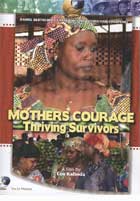
Mothers Courage, Thriving Survivors 2005
Distributed by National Film Board of Canada, 1123 Broadway, Suite 307, New York, NY 10010; 800-542-2164
Produced by Daniel Bertolino, Catherine Viau, Christian Charpenel
Directed by Léo Kalinda
DVD, color, 52 min.
Sr. High - Adult
African Studies, Gender Studies, Holocaust and Genocide Studies, Human Rights, Political Science, Psychology, Sociology
Date Entered: 01/09/2007
Reviewed by Monique Threatt, Indiana University, Herman B Wells Library, Bloomington, INFilmmaker Léo Kalinda narrates and dedicates this timely and cathartic documentary “to the memory of my massacred family.” Interweaving archival footage with courageous stories from survivors of the 1994 Rwanda genocide, Kalinda is able to bring semi-closure to understanding the genocide, loss of his mother, extended family members, neighbors and friends.
For 100 days between April and July 1994, the majority Hutus put into action to ethnically cleanse Rwanda of its minority-empowered Tutsis. The plan is to first slaughter Tutsi men and boys, followed by women and girls, and lastly a general massacre of all Tutsis. During this short period, it is estimated that nearly one million Tutsis and moderate Hutus are killed, and thousands of women and young girls raped and infected with the HIV virus to prolong an agonizing death.
Paradoxically in a post-genocide society, women survivors welcome the opportunity to become full citizens. Prior to the genocide, women are treated as children with little to no rights. In the aftermath, a significantly reduced male population is forcing Rwanda to redefine its roles for women and enact laws to empower them to become adopted parents, businesswomen, farmers, house and land owners, masons, politicians, seamstresses, and witnesses in a court of law.
The primary focus of this documentary is Athanasie Mukarwego, a mother of four and widow of the genocide. She is brutally and repeatedly raped by nearly 500 men in front of her children for three months. Miraculously, Athanasie doesn’t contract the HIV virus. In spite of the daily torment and shame, Athanasie, along with other widows of the genocide, empowers herself to survive by harnessing courage, hope and strength to tell her story to other survivors. She encourages women to form women associations, and create song and dance troupes as a form of therapy to give voice to those unable to express their traumatic experiences.
Through therapy, most of the young women speak candidly about being infected with the HIV virus, and the psychological effects of rape. One teenager tells how difficult it is for her to concentrate on her studies because she is raped at age six alongside her mother. Another teenager wails as she remembers trying to give her mother water, but is unable to do so because the mother’s neck is sliced open by a machete. One woman says she will never be the same again after watching her husband’s skull crushed.
Still, for the survivors there is some comfort in bringing the guilty to justice through the Gacaca court tribunals. However, critics estimate that it will take at least 100 years to bring all guilty parties to trial. There is also the lingering psychological and sociological damage caused by the genocide which will not be fully known for many years as the civil war left behind thousands of orphans, and women feeling guilt, and shame associated with rape.
Yet, in spite of this tragedy, this documentary serves to empower and uplift broken souls. It forces all of us to see how the dehumanization of a people is turning into a positive change for social and economic freedom. Through a determination to survive, hard work, and continual healing these women look forward to building a stronger Rwanda for all Rwandans.
Stealing a proverb from the film God Sleeps in Rwanda, “They say my country is so beautiful that although God may wander the world during the day He returns at night to sleep in Rwanda” Dufaux’s photography is breath-taking, and numerous artists contribute to a remarkable soundtrack which overshadows the brutality and beauty that is Africa. This reviewer could not find any fault with the technical aspects of the film as it was professionally made for Canadian television.
Mothers Courage, Thriving Survivors can be used to support African and gender studies, as well as studies to analyze the psychological and sociological cause and effects associated with genocide. In addition to this program, I recommend teachers, researchers and librarians consider previewing the following programs: Forsaken Cries: The Story of Rwanda(The Video Project), God Sleeps in Rwanda (Women Make Movies), In the Tall Grass (Choices Video), and In the Wake of War (Bullfrog Films).
Available in French on this DVD.
I highly recommend this film for High School, and academic media collections.